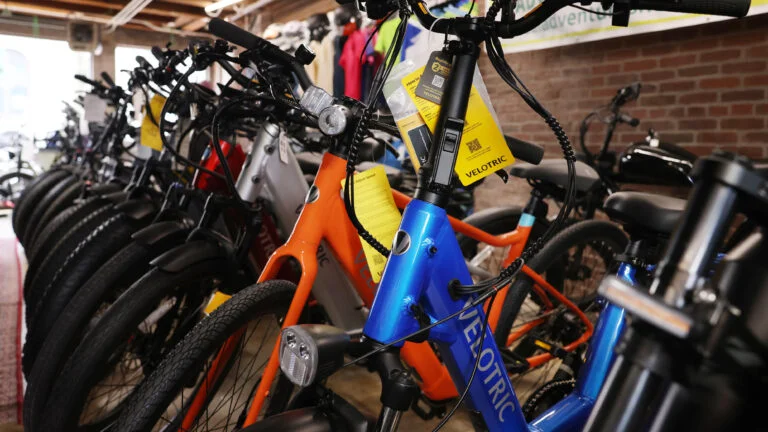Copyright Boston.com

Readers say e-bikes should face tougher rules, citing safety concerns. Though others warn against overreaction. A crash on Cape Cod has reignited debate over how Massachusetts should further regulate electric bicycles. After Lynne Forester, 69, was seriously injured on the Cape Cod Rail Trail in September, she told Boston.com she believes the state needs tougher e-bike rules to protect pedestrians. The Brewster resident’s story struck a nerve — and drew hundreds of responses from readers who said they’ve noticed an increase in fast, motorized bikes on trails and roads across the state. More than 580 readers weighed in on whether Massachusetts should strengthen its e-bike laws. The majority (78%) said yes, while 20% said no, arguing that more regulation won’t make shared-use paths safer. Two percent of readers were unsure. E-bikes in Massachusetts are currently defined and divided into two classes: Class 1 pedal-assist bikes, which provide power up to 20 miles per hour only when the rider is pedaling, and Class 2 throttle-assisted bikes, which can reach speeds of up to 20 miles per hour without pedaling. Class 1 and 2 bikes are generally treated like regular bicycles, with no license or registration needed to use them. Because they require no license, they are also not considered to be motorized vehicles. Both types of e-bikes are allowed on most paved trails, bike lanes, and roads unless restricted by local rules. The state does not currently regulate Class 3 bikes, which can exceed 20 miles per hour. Many readers who supported tighter oversight said the growing popularity of e-bikes has outpaced the state’s ability to regulate them. Fred S. of Worcester said that “e-bike riders need to be regulated to ensure safety for all users of bike paths.” Otto from Bourne agreed, arguing that “if it’s got a motor, riders need to adhere to motor vehicle regulations and be held accountable.” Others said licensing or training requirements could help keep everyone safer. “They are motorized, and their capacity to cause damage is well-documented,” said reader Jane F. of Watertown. “Requiring a license would ensure that riders had at least some sense of the rules of the road, because it is absolute madness right now.” But not everyone sees more regulation as the answer. Some readers said the crash on Cape Cod was tragic, but not evidence that e-bikes themselves are inherently dangerous. “Never create a policy from an exception,” wrote James H. “This was a negligent rider circumstance. The issue was not the e-bike. The issue was not paying attention on a bike trail with high volume and frequent use. Changing laws does not make riders more attentive.” Another reader, Sam from Boone, put it more simply: “People can ride just as fast on regular bikes. This accident had nothing to do with the fact it was an e-bike. It was just a freak accident.” While most readers favored stricter rules, the responses revealed a divide over what safety looks like on Massachusetts’ trails — and how far the state should go to enforce it. Responses have been lightly edited for grammar and clarity. Should Mass. enforce stricter e-biker regulations? Yes “As a walker and also an e-bike rider, I want a balanced approach, not some draconian ‘ebikes are evil’ reaction to this horrible accident. Set speed limits and ban throttle-only riding on some trails, but also encourage walkers to stop walking side by side across trails and stop walking with full noise cancellation enabled so they can hear bike bells!” – Eric W., Somerville “[E-bikes] should be explicitly prohibited from bike trails. The physics don’t bode well for any pedestrian or conventional cyclist who might have a collision involving an e-bike. The weight and power are overwhelming compared to their non-motorized counterparts. Please keep them off bike trails.” – Dave, Worcester “Without a license or insurance they are no different than an unlicensed and uninsured driver of a car. If somebody is injured by them, there is nobody to hold the rider accountable and no compensation for the victim.” – April S., Brookline “I’m an avid cyclist and see e-bikes as a good thing. However, additional training and mandatory helmets should be enforced. These e-bikes are more like low power motorcycles than bicycles.” – Larry L. Scituate “I think it absolutely makes sense to treat Class 2 e-bikes slightly more like motorcycles, and Class 3 e-bikes even more like motorcycles. On the other hand, I think a Class 1 e-bike (where the motor only assists you pedaling, but you are the primary power, and it won’t let you go over 20 MPH) should be treated closer to a regular bicycle. I think an 18+ limitation makes sense, but the bureaucratic cost of licensing and insurance isn’t remotely worth it, as we have seen in places that tried that with regular bicycles. Additionally, it would create a disproportionate barrier to people who need the e-assist as a mobility aid.” – Zachary Y., Somerville “These bikes are lethal weapons, just like cars, and should be similarly regulated. Special permits could be issued for seniors and the disabled to permit use on bike trails.” – Ruth C., Harwich No “‘True e-bikes’ (Class 1 and 2) are not the problem. The crash involving Ms. Forester could have been with any cyclist not looking where they were going. 20 MPH on a ‘pedal only’ bike is not unusual. The Out-of-Class Electric Vehicles (OCEVs), mistakenly called e-bikes, can go 40-50 MPH via throttle and should be classified as motor vehicles and not used on rail trails.” – Dave T., Salem, New Hampshire “If we wanted to prioritize road safety, we would focus on cars and better infrastructure. There should be no barriers to getting around by bicycle, it’s better for the body and the environment. E-bikes are a valuable tool to help those who are older or less able to get around; they should not be singled out. I would support the state creating clear legal distinctions between the classes of e-bikes and making it clear which paths/roads each class should or should not be allowed. Rather than focusing on policing people, let’s focus on classifying the bikes, and building the safe infrastructure that allows all vulnerable road users safety and accessibility.” – Will B., Somerville “Regulating speed, unfortunately, is largely a federal issue in the e-bike world. Class 1 and Class 2 are set at the manufacturing level not at the state level. While this story is tragic and I hope the best for the injured, e-bike collisions are just not happening at a rate which would warrant such harsh regulations. Cars and especially trucks are still by far the most deadly and dangerous vehicles on our roads, even with licensing, insurance and speed regulation. Sometimes it seems like actually we just need more safe routes for bikes to go on.” – Mandy W., Allston “E-bike regulations are a red herring. The only danger on roads are cars and their motorists. Thinking e-bikes are a danger denies physics and statistics. Also, there is no such license for a cyclist to get … [Plus,] e-bike regulations are ableist.” – Dave, Medford Boston.com occasionally interacts with readers by conducting informal polls and surveys. These results should be read as an unscientific gauge of readers’ opinion.



